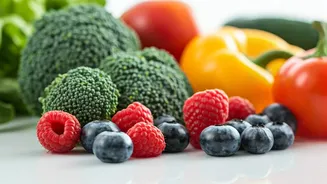Snacking for Wellness
The choices we make regarding snacks can be far more impactful than we often realize, particularly when it comes to long-term health. Regularly including
certain foods in your diet can be a proactive measure in preventing various ailments, including colon cancer. This article emphasizes the importance of mindful eating and offers a practical guide to selecting snack options that contribute positively to your health. These snacks are not just about taste; they are about fueling your body with the nutrients it needs to thrive and potentially reduce the risk of serious health issues. This approach to nutrition promotes not only physical well-being but also a sense of empowerment in managing your health.
Berries for Defence
Berries, packed with antioxidants, are a key player in the fight against colon cancer. These small but mighty fruits, which include strawberries, blueberries, and raspberries, contain compounds like anthocyanins and ellagic acid. These compounds help in neutralizing free radicals, which are harmful molecules that can damage cells and contribute to cancer development. The high fiber content in berries aids in healthy digestion and promotes a healthy gut environment, further reducing the risk of colon cancer. Consider adding a handful of berries to your morning cereal, blending them into a smoothie, or simply enjoying them as a refreshing snack. Their delightful taste is an added bonus, making them an easy and enjoyable addition to your daily routine.
Nuts and Seeds
Nuts and seeds offer a nutritional powerhouse, contributing to overall health and possibly reducing the risk of colon cancer. Rich in fiber, healthy fats, and various vitamins and minerals, they provide essential nutrients that support the body's natural defenses. Fiber is crucial for digestive health, promoting regular bowel movements and removing waste products efficiently. Nuts and seeds like almonds, walnuts, flaxseeds, and chia seeds can be easily incorporated into your diet. Sprinkle them on salads, add them to yogurt, or consume a small handful as a snack. Their versatility and nutritional benefits make them an excellent addition to any diet focused on health and cancer prevention. Make sure to consume them in moderation, as they are calorie-dense.
Yogurt's Probiotic Power
Yogurt, especially those containing live and active cultures, is a boon for gut health and a potential ally against colon cancer. The probiotics found in yogurt help maintain a balanced gut microbiome. A healthy gut is essential for proper digestion, nutrient absorption, and immune function. The probiotics in yogurt help in reducing inflammation in the gut and can inhibit the growth of harmful bacteria. Choose yogurts with minimal added sugars, and consider incorporating it into your diet daily. It can be a great snack on its own, with berries, or used in smoothies. The benefits of yogurt extend beyond gut health, with studies suggesting its role in promoting overall wellness and potentially reducing the risk of colon cancer. Ensure the yogurt you consume is low in added sugars to maximize its health benefits.
Leafy Green Vegetables
Leafy green vegetables, such as spinach, kale, and collard greens, are abundant in vitamins, minerals, and antioxidants, playing a key role in cancer prevention. These vegetables are rich in fiber, aiding digestion and promoting the removal of toxins from the body. Their high antioxidant content helps combat free radicals, which can lead to cell damage and potentially cancer development. Consuming leafy greens regularly is linked to a lower risk of several types of cancer, including colon cancer. The versatility of these vegetables allows for varied consumption methods: add them to salads, blend them into smoothies, or sauté them as a side dish. The inclusion of leafy greens in your diet provides a substantial boost to overall health, making them a cornerstone of any health-conscious diet.
Whole Grains Benefits
Whole grains, such as brown rice, quinoa, and oats, are excellent choices for a healthy diet, particularly concerning colon cancer prevention. These grains are a rich source of fiber, which is crucial for maintaining a healthy digestive system. Fiber helps regulate bowel movements and reduces the time that waste products stay in the colon, thereby reducing the risk of cancer. Whole grains also provide essential nutrients, including vitamins and minerals, that support overall health and well-being. Incorporating whole grains into your diet is easy. Consider swapping refined grains for whole-grain options in your meals, choosing whole-grain bread and pasta, and using oats in your breakfast. The consistent consumption of whole grains offers a simple yet effective way to support your body's defenses and promote long-term health, specifically aiding in reducing the risk of colon cancer.


















